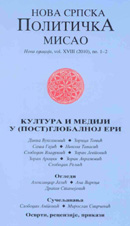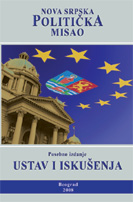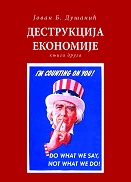 If you read western newspapers or listen to reports in the electronic media concerning the results of Sunday's elections in Serbia, then you may be forgiven for thinking that the outcome clarifies the political situation in that country and that the “pro-Western” and “pro-European Union” parties had won a decisive victory against the “ultranationalists” or simply the “nationalists.” Unfortunately, the political situation is as murky as it was before the elections and in fact, despite a significant success at the polls, the coalition gathered around President Boris Tadic (and the proud defenders of Serbia 's march into the EU) could find themselves in the opposition benches in parliament and at the losing end of coalition-forming mathematics. The bottom line is that in order for anyone to form a government it is necessary to have a simple majority of 126 votes in parliament. There are at least a variety of different ways of forming a majority based on the election results, most of them center around the victorious Democratic Party led coalition and their 102 seats in parliament. I will simply list the plausible majority forming possibilities: • For A European Serbia (Tadic led coalition - 102), The Liberal Democratic Party (14), minority parties (7) and the Socialist Party of Serbia / PUPS/JS (coalition led by Slobodan Milosevic's former party , 20) -- total of 143 • For a European Serbia (102), SPS (20) and minority parties (7) – total of 129 • For a European Serbia (102), Democratic Party Of Serbia/New Serbia coalition (led by outgoing Prime Minister Vojislav Kostunica, 30) and SPS (20) – total of 152 • For a European Serbia (102) and the DSS/NS (30) – total of 132 • For a European Serbia (102) and SPS (20) – total of 122 leading to a minority government that would need the support of either the LDP (14) or the minority parties (7) • For a European Serbia (102), LDP (14) and minority parties (7) – total of 123 leading to a minority government that would need the support of the SPS • The Radical Party (77), DSS/NS (30) and SPS (20) – total of 127 • The Radical Party (77), DSS/NS (30), SPS (20) and either the Hungarian Coalition (4) or the Bosniak Coalition (2), or both – Total of 131, 129 or 133. When you add the possibility of defections, bought/sold votes and fragility of coalitions, then the mathematical possibilities are even more mind spinning. Anything seems possible and no one can with any great certainty maintain confidence that they will either be in or out of a ruling coalition. Of course it is also possible that no one will be able to harness enough votes to form a majority and that this would lead yet again to elections. Leaving all of the numbers aside, it is possible to make a few general observations concerning Serbia 's possible political landscape. First, the success of the Tadic-led coalition, although impressive and for many observers unexpected is far from a clear mandate for Serbia's near future and upon closer examination leaves many important questions unanswered. To begin with, Serbia has been and continues to be a divided society that seems to lack the basic starting points for compromise and any consensus over major issues that define these divisions. There is consensus over Serbia 's ambition to join the European Union, all of the above mentioned political parties, including the Radicals and Kostunica's DSS, at least in public statements support joining the European Union. This consensus however begins to thin-out when the question of Kosovo's independence is added to the equation. Even Tadic's Democratic Party (DS) supports entry into the EU with Kosovo as a part of Serbia . The division in Serbian society is almost a 50/50 split where about 50 percent of the voters support entry into the EU as the greatest national priority even if at the cost of losing Kosovo; while 50 percent see preserving territorial integrity and national dignity as being the greatest national priority even if EU membership is postponed or even left unattained. The fact that President Tadic and his coalition had to create at least the hope that both membership in the EU and the preservation of Serbia's territorial integrity were both possible and compatible shows that Kosovo's independence will continue to be, for the foreseeable future, an important obstacle to both Serbia's aspiration to join the EU as well as to achieving political stability within the country. This brings us to the question of outside involvement in Serbia 's politics. EU officials and American officials not only hoped for a clear mandate for Tadic's coalition but they actively worked to help achieve this result. It would be logical to conclude that they designated this coalition as being “pro-European” not only because they feared what they saw as a possible victory for “nationalists,” but more importantly, they hoped that a Tadic victory would lead to greater flexibility in Belgrade over Kosovo's independence. In fact the two issues that have come to define what EU and American officials see as being the litmus tests for the “pro-EU” and “pro-Western” labels, the arrest and extradition of Ratko Mladic and Radovan Karadzic and a more flexible and accommodating policy toward Kosovo's independence are far from being resolved to their satisfaction and expectations following these elections. The reality is that even if Tadic and his coalition partners are insincere in their commitment to fight for Serbia 's territorial integrity, they are not in a position to significantly change the course of governmental policy on Kosovo. If they form a coalition they will have to have the support of the Socialist-led coalition that cannot betray its voters, who overwhelmingly share the Radical Party's suspicion of the West and anger over America's and EU states' sponsorship and recognition of an independent Kosovo. To do so would be to invite massive voter defection back to the Radical Party. After having fought for eight years to reclaim at least part of their voter base from the Radicals and Kostunica's DSS, it is unimaginable that any Socialist leader would risk even greater future election success in order to gain temporary power in a highly unstable ruling coalition. Tadic may find that he has rid himself of the inflexible DSS only to embrace an equally inflexible SPS when it comes to Kosovo. In short there is no clear mandate when it comes to sacrificing Kosovo for EU membership. It must also be noted that Tadic's election success had little to do with EU officials and their efforts to “assist” him, where often it appeared that they were doing their best to insure his defeat. The comical argument between European officials over what was signed with Serbia (was the SAA signed with Serbia including Kosovo or without) almost negated even its symbolic value and was only one of the missteps committed by EU officials during the campaign. All of this led Rasim Ljajic, one of Tadic's coalition partners to suggest that if these officials really wanted to help them that they should “simply shut-up.” In all likelihood, Tadic probably feels little gratitude and even less indebtedness to the EU and this may not be all that bad when it comes to possible compromises in the upcoming negotiations to form a government. Tadic in effect has reformulated a mini DOS (the Democratic Opposition of Serbia that beat Milosevic) where the only common interest that would bring at least six political parties (five in his coalition plus at least one partner from other parliamentary parties) together would simply be their desire for power. Within this type of ruling coalition there would be at least one party that openly advocated recognition (if only indirectly) of Kosovo's independence and at least one that was determined to oppose it for forever if necessary. Ideologically there will be those that embrace nationalism and those that completely despise it. One of the biggest problems will of course be dividing the spoils of victory so that every party leader feels satisfied with his position in government and his portion of the remaining public enterprises and utilities. Zoran Djindjic was a much more gifted politician and political manager than Boris Tadic has proven himself to be, but he was barely able to maintain even the most basic common course for his bickering, overly sensitive and stubborn coalition partners during his brief tenure as Prime Minister. Boris Tadic will have even a more difficult time in trying to manage a similar hodge podge of “one percenters” (parties that cannot reach the minimal census needed to enter parliament by themselves) and at least one junior partner that will feel themselves to be the king makers and that could at anytime and even on a whim end the coalition's rule. Tadic would in effect become a prisoner of uncontrollable and unreliable partners that could cost both his party and him long term political success. Another observation that can be made is that Radical Party's election set-back shows that this party can no longer count on the support of the dissatisfied and disgruntled casualties of Serbia 's democratic transition. If they want to maintain their voter base and possibly even expand it, they need to completely step away from their past as Milosevic's junior partner and redefine themselves as a party with the capacity to rule. In order to do this they need to completely distance themselves from their founder and current president, Vojislav Seselj. The Radicals have attained the maximal results possible with Seselj be he in Belgrade or in the Hague, to progress further they need to assume a more independent and self-sufficient identity, one that acknowledges Seselj and his historic role as party founder but one that firmly ends his control and manipulation of the party. Anything short of this will continue to mark the gradual decline of the Radicals regardless of if they are soon a part of a ruling coalition. Perhaps the most important development for Serbia that can result from these elections may be finally laying to rest the 1990s period of confrontation, isolation and conflict. The divisions between Milosevic's Serbia and the Serbia of opposition to his regime would be united in any coalition in which the Socialists would participate. This would be more definitive if Tadic's DS will partner with the SPS, but it will also be true if the SPS and Radicals will partner with Kostunica's DSS. The DS was the party of the architect and manager, Djindjic, of the opposition victory over Milosevic in 2000 while Kostunica was the man who beat him at the polls. Now both men's parties would eagerly return the Socialists to power. For Serbia this marks the end of an era of bitter political confrontation but may mark the beginning of a new one that is no less bitter and divisive. Either way, these elections will not produce a clearer direction for Serbia 's continued transition nor will it necessarily lead to greater stability. In the end, these elections have done little to end the national angst and uncertainty within Serbia over its future. Serbia will continue to muddle through fractious politics, inefficient governance and in general, uncertainty over where it is headed. The best that can be hoped for is that this is done without violence and within the fragile institutions of government. This is not ideal but it is better than what came before it and it comes in spite of the bumbling and often hypocritical assistance/interference from the European Union and the US . This will have to do for now. |




.jpg)





















